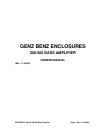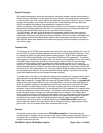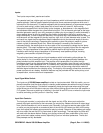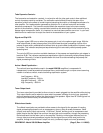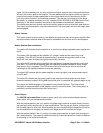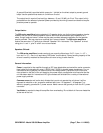GENZ BENZ - Model 250/500 Bass Amplifier (Page 5, Rev: 1/14/2006)
Tube Dynamics Controls -
The harmonics and saturation controls, in conjunction with the tube gain control, allow additional
control of preamp overdrive variables. The saturation control affects primarily the apex of the
waveform, similar to the effect of overdriving and saturating the output or interstage transformer of a
tube amplifier. Our implementation generates a distortion rich in second harmonics and subtle
waveform compression. The harmonic control affects the waveform closer to the zero crossing
portion of the waveform, yielding a more distinct overdrive with added higher order harmonics and a
steeper signal compression factor. It is important to note that these controls are not an “in your face”
distortion but a creative tool to sculpt the overdrive characteristics of your system.
Signal and Clip LED -
The green signal LED turns on when the preamp gain is set in the optimum gain range. With the
wide output levels of today’s bass guitars, this level allows the signal processing circuits of the
preamp to work within predictable and defined limits to give the best combination of dynamic range
and noise. This indicator samples post equalization signal to accurately reflect preamp system
operating level.
The red clip LED turns on when available headroom in the preamp and equalization gain stages is
less than 6 dB. The indicator samples post equalization signal to accurately reflect preamp system
headroom. Generally, it is best to operate below this level to avoid overloading the preamp and
signal processing circuits.
Active 4 Band Equalization -
The active 4 band equalization used in the model 250/500 amplifiers is composed of 4
independently tuned asymmetrical bandpass filters, combined through a unique current summing
network to create a smooth, musical sounding equalization system.
Low Frequency - 80 Hz
Low-Mid Frequency - 500 Hz
High-Mid Frequency - 1000 Hz
High Frequency - 4000 Hz
Tuner Output Jack -
The tuner output jack is provided to allow a tuner to remain plugged into the amplifier while playing.
This output remains active when the mute switch is pressed, allowing for tuning your instrument
while not sending signal to either the direct output or the speaker. Signal level of -30dB (typical hot
bass level) will drive virtually all commercial tuners.
Effects Insert Jacks -
The effects insert jacks are provided to allow access to the signal for the purpose of inserting
signal processing equipment such as compressors, chorus, delay & reverb processors. Send
(output) and return (input) are nominal -10 dB level. “Series” devices (such as compressors and
gates) require that the signal flow out from the send jack on the amplifier, through the processing
device and back into the return jack on the amplifier. Parallel or mixed signal devices (such as
chorus, delay and reverb processors) require that the signal flow out of the send jack on the
amplifier, through the unit where it is split into a dry (unaltered) signal and a wet (processed)



